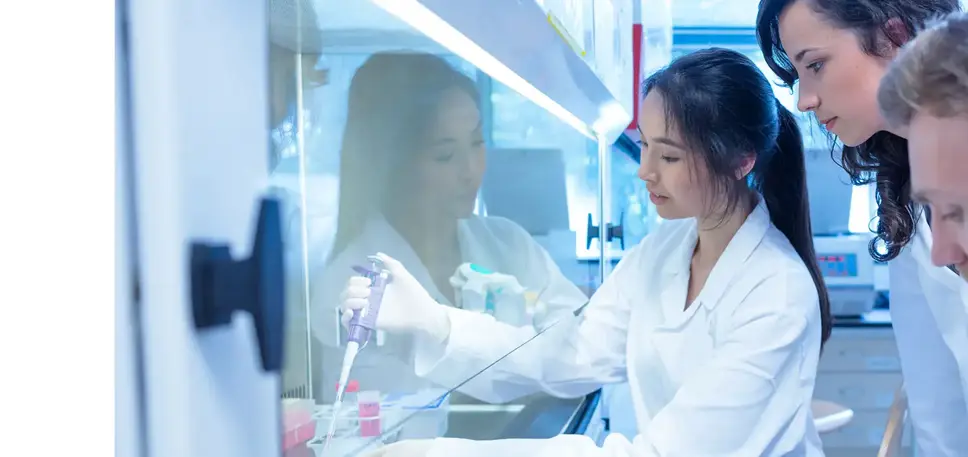Job roles

More than 65% of all medical research and development in the UK is carried out by the pharmaceutical industry.
Even at the start of the 21st century there are many diseases which cannot be cured by existing medicines and surgical treatment. For some there are treatments available, but they often involve complicated combinations of medicines, or the medicines have side effects which discourage people from taking them.
So, discovery and development of new medicines is still very important. Pharmaceutical companies in the UK employ thousands of people, 73,000 at the last count, including laboratory scientists, engineers, IT professionals, statisticians, doctors, pharmacists, marketing managers, medical representatives and many others. In addition to these, there are more than 6,000 people working for specialist companies which provide services to the sector.
Research and Development
The pharmaceutical industry is the most research-intensive business sector in the UK, with £4.1 billion spent on research and development in 2016 alone. This accounts for almost a quarter of total UK expenditure on R&D.
The scientific endeavour to find new leads in innovative medicines has never been more efficient nor fast. The process is exciting and stimulating despite often taking years. It can be frustrating at times, but when that one compound that might eventually make it out on to the market is discovered, the satisfaction is unbelievable. Most of this work is carried out by scientists, mainly biologists and chemists, with a variety of specialist qualifications in, for example, toxicology, pharmacology, genetics, statistics, mathematical modelling and animal technology.
The many disciplines may seem bewildering at first, but take the time to browse and find out how you could have a role to play in the development of a new medicine, using the links at the side of the page.
Manufacturing and Supply
If you like the idea of a career where your own skills develop as fast as the technology that you’re exploiting, then manufacture is ideal.
The Research and Development of a new medicine calls for endless dedication and massive investment, but it’s only the first stage in making a medicine available to patients.
Equally vital are the jobs of the manufacturers, engineers and quality professionals who support the need to actually produce the medicine, so that not only is it available in large enough quantities to meet worldwide demand, but also meets regulatory demands which require the highest possible standards of safety and quality.
It’s the sharp end of the business, so there are strong commercial pressures, and there are constant advances in technology which must be harnessed to improve efficiency even further. The real focus behind all the hard work is always the people who will eventually benefit from the product. Which is why manufacturing in our industry is so satisfying.
Manufacturing and Supply roles
Commercial
Within the commercial side of a company there are a large number of people working towards promoting the medicines their company produces.
Prescription medicines are not allowed to be advertised to the general public in the UK. Instead they must be promoted to doctors, who then choose whether to prescribe them.
Adverts in medical journals, conferences and presentations tell doctors about the medicine, but most information comes from medical representatives involved in Sales and marketing. Medical reps visit doctors on a regular basis to tell them about their company’s new products, and to answer any questions they have.
Sales managers, health economics experts, healthcare communication professionals and product managers all work together with the aim to promote new medicines for the benefit of patients.
Commercial roles
Support functions
As with all large organisations, pharmaceutical companies need an infrastructure to run them.
Within the pharmaceutical industry there are many people who are there to support the work of the scientists and manufacturers.
For example:
- Legal experts carry out various important roles. These include ensuring that appropriate patents are taken out for the structure and synthesis of specific molecules as well as generating contracts for suppliers. Please see the Patenting page for more information on this role in industry.
- Statisticians are involved at all stages, from ensuring that the animal studies will produce valid results, to monitoring process controls. For more information, please visit the Statisticians page.
- Regulatory affairs pull together all the information that is needed for a medicine to be approved for marketing. For more information, please see the Regulatory Affairs page.
In addition to these, very large company needs departments such as Human Resources, Training & Development, IT and Finance.